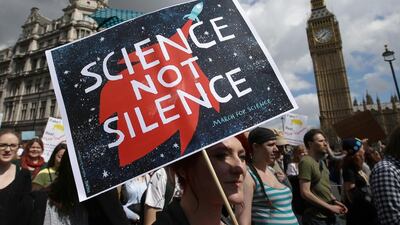National Edirtorial
Tens of thousands of people took to the streets of cities around the world last weekend in support of science. Under the new White House administration of Donald Trump, science has taken a beating. From the slashing of funding for climate change-related projects to sweeping budget cuts for the Environmental Protection Agency, many Americans (and people around the world) feel that science is under assault. But the large numbers attending the science marches were driven by something deeper.
Scientific endeavours are driven by the burden of proof, which necessarily involves the use of facts. With a new administration that has an increasingly antagonistic relationship with facts, the proof principle underlining scientific research is needed now more than ever. That is why people took to the streets. Marching under the banner “without science, it’s just fiction”, thousands continued their battle for truth in a post-truth world.

